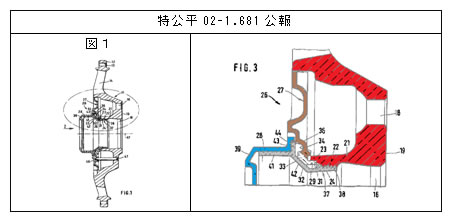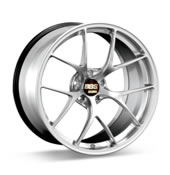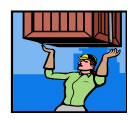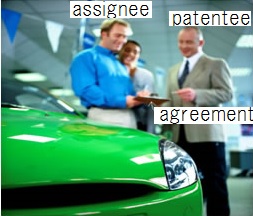Summary of BBS Parallel Importation Case in JapanPossibility Of Injunctive Relief From Patent Infringement Induced By Parallel Imports
Disputes Up To High Court
BBS Kraftfahrzeugtechnik AG in Germany owned German and Japanese patent rights to protect their aluminum automobile wheels.

Japanese patent No. 1,629,869 was notified in the examined patent publication (instead of the patent publication at that time).
On the other hand, there was an importer who purchased the patented products legitimately from BBS in Germany, and imported the products from Germany to Japan for sale.
As to the aluminum automobile wheels sold by BBS, an example (not exactly the accused product in this case) is shown below, in which a logo of BBS can be recognized at the center.

Against the importer conducting such parallel importation, BBS filed an infringement lawsuit on the basis of their Japanese patent right with the Tokyo District Court as the first instance, and the court fully allowed the injunctive relief sought by the patentee (BBS).
The Tokyo High Court as the second instance, however, reversed the judgment of the first instance, and dismissed the claim of injunction of the parallel importation.
The patentee, BBS, thus filed a petition of final appeal with the Supreme Court.
Why Was Parallel Importation In Dispute?
The “parallel importation” is to import genuine products of foreign companies, sold/purchased legitimately in foreign countries, into Japan.
Originally, the importation should be free, but a problem occurs in a particular circumstance where it is conducted via different channels without authorized agencies.
In general, parallel-imported products are often lower in price than those imported through the authorized agencies. The agencies have spent costs of upkeep and advertisement for a long time, which would obviously result in a higher price in comparison with the products imported irregularly by parallel importers. It is natural that users would like to purchase the products of lower price at their option as long as the products are the same genuine ones.
For this reason, in an attempt to prohibit the parallel importation of target products from a foreign country to Japan, a foreign patentee (foreign manufacturer) and authorized agencies obtained patent rights for the products not only in the foreign country but also in Japan.
Doctrine Of Exhaustion In Japan
The Supreme Court’s decision affirmed a conclusion in itself of the Tokyo High Court. Hereinafter, how the court’s decision reached such a conclusion will be explained.
First, the doctrine of exhaustion applied to the domestic transactions was stated as follows:
| If patented products are sold domestically by a patentee or licensee in Japan, a patent right of each product is deemed to be exhausted because it has fulfilled its purpose. The patent right has no legal effects on the act of using, assigning, or leasing each product. |
The grounds for patent-right exhaustion were provided in detail in the court’s opinion, but such grounds will not be explained here, due to the fact that they were not a first concern of the court.
Is Doctrine Applicable To Importation?
Second, the opinion below was provided for a patent right in relation to the importation, in contrast to the case of the domestic distribution of products in the court’s opinion above.

From Double-Reward Viewpoint
First, the court found that, in a circumstance where a patentee both in a foreign country and in Japan assigns the patented product (genuine products) to a third party in the foreign country and the assigned product is imported to Japan, enforceability of a patent right in Japan cannot readily be discussed in the same manner as the domestic case. One of the grounds for such a court’s holding was related to “double reward.”
- In the foreign country with a location of assignment of the patented product, the patentee does not always own the foreign patent right (the counterpart patent right) with respect to the same invention of the Japanese patent right.
- Even if the counterpart patent right is owned by the patentee in the foreign country with the location of assignment, this patent right is a right separate from the patent right owned by the patentee in Japan.
- In view of the above, even if the patentee enforces, in Japan, the Japanese patent right to the product associated with the counterpart patent right, it cannot readily be argued on such grounds that the patentee obtains the double reward.

Conventionally, the same patentee owning an X patent right in an X country and a Y patent right in a Y country had not been allowed to seek the injunctive relief from the importation of the patentee’s produced products from the X country to the Y country on the basis of the Y patent right, from an international standpoint. It had relied upon a principle of prohibiting “double reward.”
According to the court’s decision, however, it was concluded that, even if a reward had been obtained on the basis of a foreign patent right in a foreign country, another reward could be obtained (double reward) separately in Japan without any inconvenience.
In view of the above, it was concluded that the Japanese patent right owned by the foreign patentee had not been exhausted by the parallel importation, and therefore the injunctive relief sought by the patentee on the basis of such an enforceable patent right might be allowed.
From International-Transaction Viewpoint
Second, as to the international transactions, the court found that:
| In view of a balance of the circulation of products and a right of the patentee in the international transactions, it is requested that precedence be given to the freedom of the circulation (including importation) of products to the maximum extent, even for the products put into circulation in a Japanese market after having being sold and imported from abroad by a Japanese dealer, in light of circumstances where the international economic transactions are going to be broadly and highly developed in our present-day society. |
If the freedom of the international circulation is given precedence to the maximum extent, it is assumed that, in Japan, the patentee would not be allowed to enforce the Japanese patent right to the genuine product sold by the same patentee in the foreign country, and therefore the injunctive relief would not be allowed.

From Implied-License Viewpoint
Third, as to the implied license, the court found that:
| It may safely be said that, in the economic transactions in the foreign countries, such transactions could be conducted on the premise that generally an assignor assigns to an assignee all rights to the assigned products and in turn the assignee obtains all the rights owned by the assignor. In light of the international transactions in modern society as described above, if the patentee assigns the patented products outside Japan, it could obviously be foreseen that the assignee or third parties reassigned with the products by the assignee would import such products to Japan as business, use the imported products in Japan as business, or reassign the products to others. |
The foreign patentee should have contemplated the import into Japan, and the importer should have also made purchases with this in view.
It has thus led to the assumption that the same patentee as the foreign patentee would not be allowed to enforce the Japanese patent right in Japan, and therefore the injunctive relief would not be allowed.
Passive Decision
A rationale to be selected among: obtainment of double reward; international circulation; and implied license, as described above, was relied upon by the conclusion of whether or not the injunctive relief sought by the patentee should be allowed in Japan.
The court provided a passive decision with the proviso that “unless the condition is met, the enforcement of the patent right to the patented product is not allowed in Japan.”
It should NOT be construed, however, that “the enforcement of the patent right is allowed if the condition is met” falls within the ambit of the court’s decision.
What Is The Condition?
In view of the above, the condition to be met is summed up as follows.
The circumstance where a Japanese patentee (or an equivalent person) assigns a patented product outside Japan is divided into the two circumstances below:
- To assignee directly from patentee:
It is proper to construe that, unless a patentee has an agreement (such as a sales agreement) to “exclude Japan from areas for sale or use of a patented product” with an assignee, the patentee is not allowed to enforce their patent right to the assigned product against the assignee in Japan.

- To subsequent assignee from assignee:
It is proper to construe that, unless (1) the assignee has the above agreement (such as a sales agreement) with a third party and a subsequent assignee reassigned with the patented product by the assignee, and (2) the agreed matter is explicitly indicated on the patented product (by affixing a label, for example), the patentee is not allowed to enforce their patent right to the reassigned product against the third party and the subsequent assignee in Japan.
In such a manner, the court’s holding was in the form: “unless the condition…is met, the patentee is not allowed to…”
Rationale Relied Upon By Conclusion
The rationales are shown below:
- First, for Implied License, if the patented products are assigned outside Japan, the importation of such products to Japan could obviously be foreseen. It is thus construed that, if the patented products are assigned by the patentee without addition of any proviso outside Japan, the assignee and the subsequent assignee are provided by the patentee with the implied license to control the products beyond the patentee’s control in Japan.
- Second, for protection of interests of patentee to whom attention is now directed by this Court, the patentee should be allowed to add the proviso of the future patent-right enforcement in Japan to the assignment of the patented products outside Japan so that: if (1) the patentee has an agreement to exclude Japan from areas for sale or use of the products with the assignee at a time of the assignment, and (2) the agreed matter is explicitly indicated on the products, the subsequent assignee, even in the circulation of the assigned products via any other parties, could also recognize restrictive conditions of the agreement so as to freely determine whether to purchase the products or not under the restrictive conditions.
- For scope of patentee, it is construed that, even if the assignment of the patented products outside Japan is carried out by equivalent persons of the patentee such as subsidiary or relevant companies, such assignment falls within the scope of the assignment carried out by the patentee themselves.
- For whether counterpart patent right is present in foreign country with a location where the first assignment of the patented product is carried out, the protection of trust by the assignee on the freedom of the circulation of the patented product does not depend upon the counterpart patent right. It was clarified that the assignee’s trust should be protected irrespective of whether the counterpart patent right is present or not.
This Case
By applying the above to the present case, the Supreme Court held that:
| The aluminum wheels in this case are those sold by the patentee in Germany. The patentee neither made an agreement to exclude Japan from areas for sale or use of the products with the assignee at a time of sale, nor indicated explicitly the agreed matter on the products. Thus, BBS is not allowed to seek any injunction or damages for the aluminum wheels in this case based upon their patent right. |
In such a manner, the Supreme Court clarified that, unless an agreement and an explicit indication for an export destination have been realized at a time of the assignment of the patented products, the parallel importation of the patented products cannot be prohibited.
It could NOT be construed, however, that, if the agreement and the explicit indication for the restricted import destination are realized at a time of the assignment outside Japan, the injunctive relief sought by the patentee is allowed in Japan.
This is because the future circumstances are unforeseen in such a manner of the Supreme Court’s holding that the “double reward” may be allowed.
It is to be understood that merely a part of the criteria to conclude that a certain parallel importation does not infringe upon the patent right was provided by the Supreme Court.
If you have any questions concerning the above, please feel free to contact us by sending email to inter@ypat.gr.jp.
